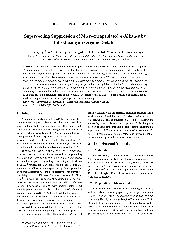摘要
Supercooling of the microencapsulated phase change materials(PCMs) during cooling usually happens. This phenomenon can interfere with heat transfer and is necessary to further overcome. In this study, melamine-formaldehyde microcapsules containing two n-alkane PCMs, namely, n-dodecane(C-12) or n-tetradecane(C-14) were prepared by in situ polymerization. A small amount of n-hexatriacontane(C-36) was introduced as an organic gelator into the core of microcapsules to cope with the supercooling problem. Analyses demonstrate that supercooling of the microencapsulated C-12 or C-14 was significantly suppressed by adding 3%(mass fraction) C-36, without changing the spherical morphology and dispersibility. It could be also found that the enthalpy of microencapsulated C-12 or C-14 containing C-36 was similar to that of microencapsulated n-alkanes without C-36, whereas the difference between onsets of crystallization and melting(degree of supercooling) is similar to that of those of pure n-alkanes, suggesting the remarkable suppression ability of the organic gelator on supercooling.
- 出版日期2012-5
- 单位天津大学
